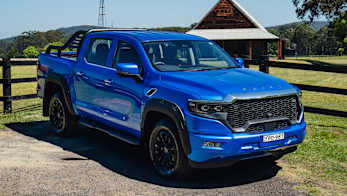Peugeot reckons you shop with your eyes. That should mean the company will sell plenty of this car, the new Peugeot 508 2019 model.
The problem will be convincing the other, more brain-like parts of its potential customers that this is a vehicle worth considering. Most people want SUVs now, and Peugeot has the impressive seven-seat 5008 SUV if you want something like that.
But there are reasons that this car is more appealing than an SUV. More than just its striking design, this is a car with style and substance.
Peugeot 508 2019: Allure HDi
| Engine Type | Diesel Turbo 4, 2.0L |
|---|---|
| Fuel Type | Diesel |
| Fuel Efficiency | 5.7L/100km (combined) |
| Seating | 5 |
| Price From | $36,850 - $43,890 |
| Safety Rating |
|
Does it represent good value for the price? What features does it come with?
7 / 10
The exact pricing and specifications are still to be confirmed for the new Peugeot 508, but we can make some educated guesses.
It is expected that the target zone for the range is between $45,000 and $55,000, meaning it'll compete with upper-end versions of mainstream rivals like the Mazda6 and Skoda Octavia, and under the likes of the Volkswagen Arteon. You might also consider it a more affordable alternative to the likes of the Audi A5, Mercedes-Benz CLA-Class or BMW 4 Series GranCoupe.
.jpg)
It is possible that there'll be three grades offered, and the Fastback hatch and Touring wagon of each. But we'd bank on a more simple line-up, with maybe three or four versions of the 508 to choose from.
We sampled the GT-Line and the flagship GT. Full specifications will follow closer to the local launch of the 508 range in the second quarter of 2019.
.jpg)
Is there anything interesting about its design?
9 / 10
Yes, there's a lot that's interesting about the design. But the main point is that it's absolutely gorgeous.
Having spent a few days in and around 508s, I struggled to find a bad angle to the exterior styling. I don't think there is one. Even the lower-grade models look good on smaller (18-inch) wheels, while the GT on 19s looks just right.
From the sharp LED daytime running lights that drop like fangs from the maw of the front end, to the elegant lines that run side to side and the full LED headlight clusters, the front is pretty. I even like that it proudly has '508' brandished above the lion emblem on the grille.
And while Peugeot is acting like most European manufacturers in saying the car is inspired by a coupe, it actually does kind of look like a four-door coupe without being tryhard about it. Peugeot officially calls it a fastback.
.jpg)
Little things like pillarless doors help in that regard - they're very sporty for a mainstream model. And while it might be a convincing sedan shape to some, it's actually one of those clever liftback hatches. We'll get to the practicalities of that in the next section.
The rear end is simple in its styling; the smoked tail-light finish and black central finisher mean it's not fussy in any way back there.
.jpg)
How practical is the space inside?
8 / 10
Yes, there'll be a Touring version; a wagon model known as the 508 SW in Europe. And yes, it'll be more practical, with a bigger boot and arguably even more kerb appeal.
But the 508 Fastback was the model we tested, and it doesn't disappoint too much for usability and practicality.
The boot is said to offer 487 litres of cargo capacity, which is pretty decent for a vehicle of this size, and the storage space can expand to 1537L with the back seats folded down. And unlike lots of Peugeots that have come before it, there's decent storage in the cabin, too.
.jpg)
Yep, you even get good-sized cup holders! There are two between the front seats, and the door pockets are decent, too.
More impressive than the storage, though, is the presentation of the cabin. The finishes are lovely, and at a quick glance it feels more convincing in terms of premium-ness than some other European models from more expensive brands.
The 508 has Peugeot's i-cockpit set-up, which means there's a small steering wheel that you look over the top of to see the instruments. It's polarising - some people don't like having a steering wheel sitting so low - but personally, I love it.
.jpg)
The 12.3-inch digital info screen itself is lovely, and offers a lot of different views and configurations depending on what you want to see. Plus there's a 10.0-inch touchscreen media system with sat nav, plus there's Apple CarPlay or Android Auto. All models are expected to get wireless phone charging as well.
The seats offer good adjustment and reasonable comfort, but the ones in our test vehicles were the sports seats in the optional Nappa leather trim, and they were are a bit hard. Hopefully the lower grade versions without leather are a bit cushier.
.jpg)
Another complaint in the cars we tested was some questionable fit and finish. The paddleshifters, for instance, are constructed of several parts, none of which fit together very well (why not just a single aluminium piece, Peugeot?). We also noted a squeaky, loose centre console in one car, and some uneven fitment lines across the dashboard.
What about back seat space? With the driver's seat set in my position (I'm six-foot tall, or 182cm) the room back there isn't tremendous, but I would be comfortable for a couple of hours.
.jpg)
There's good knee room but anyone taller than me might struggle for headroom, especially when getting in and out - that coupe-style roofline has its downsides. And people with big feet may complain about the toe room. I've got size-12 feet and they were cramped.
There are the requisite ISOFIX child-seat anchor points and top tethers, and while the new model is wider than the 508 that came before it, three-across might still be a squish. At least there are rear air vents and the seats are pretty comfy.
.jpg)
What are the key stats for the engine and transmission?
8 / 10
Australia will get two drivetrains - both 1.6-litre, four-cylinder engines, both turbocharged, both front-wheel drive, both with an eight-speed automatic transmission.
The difference is the power outputs. The low-spec model has a 180 horsepower rating, which translates to 133kW, and it has 250Nm of torque.
The flagship drivetrain in the GT model has 225 horsepower, or 168kW, and 350Nm. This model has a zero-100km/h claim of just 7.3 seconds. The other version claims 7.9sec.
How much fuel does it consume?
7 / 10
The official European claimed fuel consumption for the high-spec engine is rated at just 6.5L/100km, while the less powerful engine uses a touch less fuel at 6.0L/100km. I saw displayed fuel use on test - with a mix of freeway, traffic-snarled highway, back road and spirited driving - of 8.9L/100km.
Fuel tank capacity is 62 litres. It requires 95RON premium unleaded fuel.
What's it like to drive?
8 / 10
Having spent time in both variants, it's fair to say you probably don't need the GT with the extra grunt, but it is a nicer car overall.
That's because the GT gets the additional 35kW and 100Nm - increases of 15 and 40 per cent, respectively - which translates to a considerably more urgent response under hard throttle. It's a quick car, let down a bit by the eight-speed automatic transmission which has a tendency to hang on to gears if you decide to back off the throttle, letting the revs linger higher than you might want.
The lower-output engine is suitable for meeting the requirements of the vast majority of buyers in this part of the market, with decent pulling power and rolling response, but there's a bit of low-rev lag to contend with.
.jpg)
The 508's drive mode system allows you to choose between Sport, Normal and Comfort modes for the steering, transmission and throttle calibration, and the GT's version also adjusts the car's adaptive dampers. You can notice it more at higher speeds on bumpy roads - in Sport mode, the GT's 19s can be a touch terse, where comfort allows a little more in the way of bump-soak through the suspension.
The GT-Line on 18s felt reasonably judged in terms of suspension, with a slightly firm edge to the ride. I'm very intrigued as to how each will cope with Australia's, ahem, poorer road surfaces.
I like the small steering wheel and it feels pretty agile for a car of this size, with pretty nippy steering at higher speeds. It is a little lifeless in terms of feel, though, so enthusiasts may be left wanting more.
One thing that stood out was how quiet it was. Admittedly our drive wasn't on coarse-chip roads like those so prominent in Australia, but the cabin was nicely muted at freeway pace, rather well insulated from road and wind noise, and the engine - which sounded pretty snarly under hard throttle - was hushed enough in more sedate moments.
.jpg)
Warranty & Safety Rating
What safety equipment is fitted? What safety rating?
8 / 10
At the time of writing, the new-generation version of the Peugeot 508 hadn't been tested by Euro NCAP or ANCAP, so we can't vouch for its safety rating. But the brand says it "offers a wide range of latest-generation driving aids that notably meet EuroNCAP criteria, which are ever more demanding".
Every model globally is fitted with autonomous emergency braking (AEB) with pedestrian and cyclist detection (up to 140km/h), a reversing camera, plus there are available advanced items like a Night Vision system (infrared camera), a 360-degree camera with parking sensors all around and semi-autonomous parking assist.
Other tech items expected to be offered include: adaptive cruise control, lane keeping assist, driver fatigue alert, high-beam assist, speed limit recognition, and active blind-spot monitoring (with intervention). There are six airbags, too.
Because we don't know what we'll get in Australia, and what will be standard or optional, we've gone with an 8/10 here.
What does it cost to own? What warranty is offered?
7 / 10
The warranty period offered by Peugeot is now five years/unlimited kilometres, and you get the same cover for roadside assist, too.
The brand also has a capped-price service program, known as its Service Price Promise, which covers up to nine years/180,000km. The service intervals for the current 508 model are every 12 months or 20,000km, which is nice and generous.
While service pricing isn't confirmed yet for the new model, it is expected that the costs will be higher than some of the mainstream competition. The existing model averaged $605 per service - double some rivals. So unless it's considerably more affordable for the new model, we're lopping some points off for that.
.jpg)
Verdict
So is it worth considering the 508? Well that will depend on how it's priced. We won't know that til mid-2019, but all signs point to this being a compelling option, and a nice alternative to some of those other luxury-focused European models, too.
Has the Peugeot 508 done enough to lure buyers away from the German brands? Tell us what you think in the comments section below.
Range and Specs
| Vehicle | Specs | Price* |
|---|---|---|
| Allure HDi | 2.0L, Diesel, 6 SPEED AUTOMATIC | $36,850 - $43,890 |






.jpg)
.jpg)
.jpg)
.jpg)
.jpg)
.jpg)
.jpg)
.jpg)




.png)



.png)



.jpg)



.jpg)
